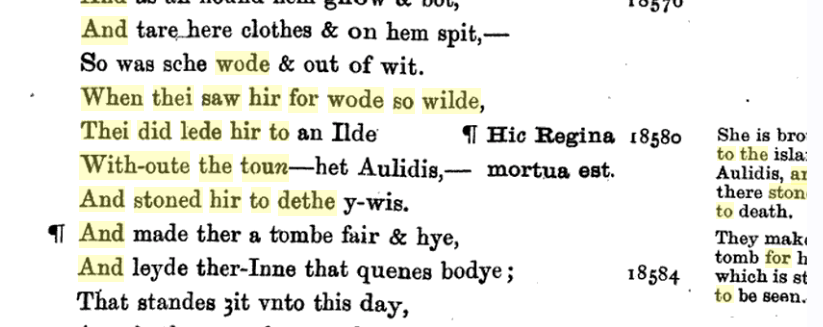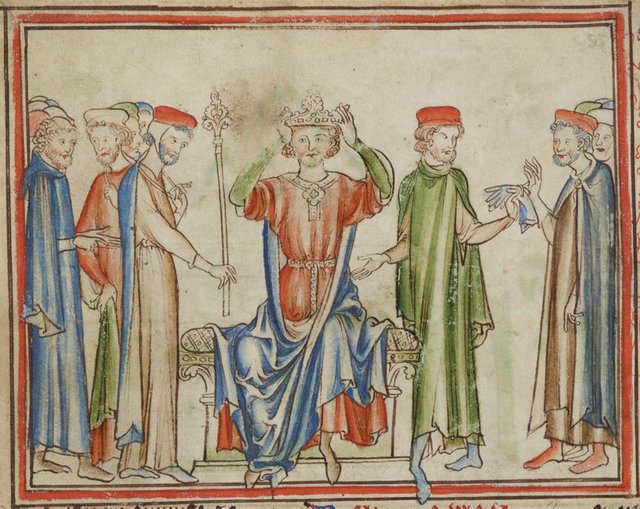Etymology Of God, Woden(Odin), And Seidr(Seithr)
The word God is derived from the word gad. Gad also shares a root with the word goad. Gad was a word used to describe the point of a weapon, a spear. Often times the word was used to describe a pointed stick used to prod animals such as cattle. Similarly a goad is a stick used to prod animals in addition to being used to describe persuasion.
The Anglo Saxon rune poem associated God with speech for the fourth rune because God is gad/goad. God is the force that prods the universe and controls the universe much like a cattle prod. Similarly the Bible states that God created the universe through speech and stated humans were made in the image of God, in other words humans were endowed with the ability for speech. In other words it is through speech that humans prod the universe and guide it along in different directions.
Perhaps there is one God overseeing the universe, perhaps not. These are some speculations though.
This is also why the internet is so toxic, it is basically people using a power that is equivalent to the power of a cattle prod except they are using it on each other constantly. Speech is essentially domestication and silence is wilderness. Is God a being? I doubt it, I believe the universe has always existed. However I do believe that God is the power of speech. There are as many gods as there are humans and other creatures endowed with speech(in some way). I define God as being gad, God is a goad. God is a spear used to prod and control the universe, the spears. The spears of destiny are the tongues of people.
The norse rune poem states that estuary(river MOUTH) is the way of most journeys(this means that the mouth guides the fate of the world, the journeys of energy and consciousness and life) and that a scabbard is where swords are placed in... this equates a tongue with a sword(or a goad/gad). The word Os means God in old English but it means mouth in Latin. This was the term used for God in the Anglo Saxon rune poem.
The term God in Anglo Saxon rune poem simply means speech. There are many tongues goading the world. God is not a being, god is an action that people engage in, God is the act of talking. This is why when people have sex they sometimes say: oh my God. They are basically saying: oh my goad, they are referring to their lover as the one who goads them. They are declaring their lover to be their manipulator. There are as many gods(goads) as their are tongues. There is not one God(goad). There are many.
Sometimes people say "oh my Gad" as a way of saying "Oh my God".
The term Lord is used in the anglo saxon rune poem a few times. Lord does not refer to God in this poem. The Lord refers to Woden. Woden is The Lord being referred to in The Anglo Saxon rune poem. Woden is one of the names for Odin. Wode is a word that means furious. Woods were thought to grant a person the ability to be wode. Woden is the one who can harness wode and use it upon enemies. Wode is not meant to be directed at friends and family, to direct wode at friends and family is a sign of weakness because it means your ire is being redirected away from enemies. This is why the command to love your enemies is so dangerous. It can lead to one taking ones anger out on friends.
One of the reasons animal experimentation has developed to such a high degree in so called civilized nations is because people have suppressed feelings of aggression towards their oppressors to a very high degree and they have taken to redirecting their aggression upon helpless animals and have developed a system of enacting this aggression under scientific pretenses.
The Laud Troy Book has an example of wode being used to mean furious, it is an old book written at a time when the word wode was in common usage.

Woden is not furious with everyone, just his enemies. This also relates to seithr(seidr), that is the word for magic in ancient norse, seidr is witchcraft. It relates to the word seething. As in seething with emotional intensity like boiling water. They would seethe with emotion when inscribing the runes and directing that emotion into charging the runic talismans. Or seethe while muttering black incantations(intercessory affirmations, galdr).
Some people have used bodily fluids to charge talismans however this is a very crude and primitive thing to do. Energy is electromagnetic. Just looking at a sigil or runic talisman transfers energy to it. Where attention goes energy flows. Seething as one is writing it is a manner of charging it. Women who would mutter in anger would often be accused of witchcraft. The seething of the emotions is what let to the spontaneous muttering. These are forms of curses, or in some cases blessings.
As for other pertinent etymologies:
Anglo is rooted in the word angle, as in angling for fish. These were fishermen. The Saxons have their name rooted in the word Seax which is a type of knife, they were mercenaries. Below is an old image depicting an anglo saxon king.

Was there a meditative tradition among the ancient Norse? At the moment it is hard for me to say. Odin giving an eye to Mimir appears to represent closing the eyes. Mimir appears to be related to the word memory. Mimir, memory, mimiry. Mimor in old english means: mindful, remembering, memor. The word mammer means to think things through. The brain has been understood as being like a pool of liquid that ripples in response to sound vibration. This is why media messages are so important, they set the tone and guide the mental vibrations of society. The well of mimir appears to be the brain. The offering of an eye to Mimir does seem to represent closing the eyes. So there is some sort of meditative tradition there but whether or not it was comparable to anything found in India I cannot say at the moment with a high degree of certainty. I do think though that it is acceptable for a Norse or Germanic or Celtic pagan to incorporate some meditative practices into their religion.
long post. not good.
Follow and Upvote Me: https://steemit.com/planes/@saifursujan/unorthodox-angle-shots-in-planes
Spamming comments is frowned upon by the community.
Continued comment spamming may result in action from the cheetah bot.